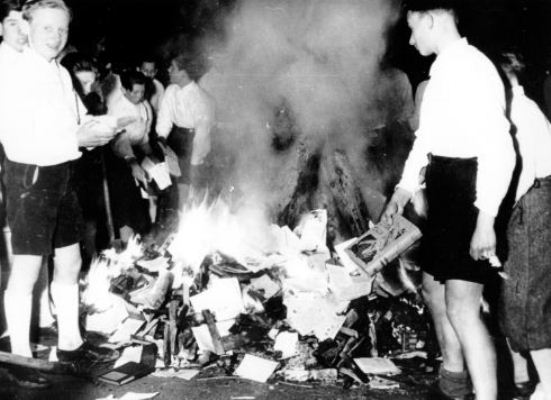[If] the Jew is victorious over the other peoples of the world his crown will be the funeral wreath of humanity and this planet will, as it did thousands of years ago, move through the ether devoid of men … Hence today I believe I am acting in accordance with the will of the Almighty Creator: by defending myself against the Jew, I am fighting for the work of the Lord.
Adolf Hitler penned these words in 1924. By 1945, approximately six million Jews had been systematically murdered. Now, for the first time since 1945, Mein Kampf is being reprinted in Germany. The reprinting of Hitler’s magnum opus, which outlines his ideology and in particular his fervent anti-Semitism, is an initiative of the Institute for Contemporary History in Germany. The new copy will be heavily annotated, with the word count more than doubling as the book balloons from 700 to around 2,000 pages. The Institute’s Deputy Director, Magnus Brechtken, believes the reprinting is a ‘useful way of communicating historical education and enlightenment.’
Critics insist the reprinting is the equivalent of lighting the fuse of fascism in the twenty-first century. Charlotte Knobloch, head of the Jewish community in Munich, warns that ‘it is the worst anti-Semitic pamphlet and a guidebook for the Holocaust. It is a Pandora’s box that, once opened again, cannot be closed.’
If Mein Kampf really does provide the blueprint for future genocides, the timing of the reprint is unfortunate, to say the least. Anti-Semitism is once again on the rise across Europe. Swastikas are scrawled on synagogues; Jewish businesses are incinerated by Molotov cocktails; anti-Jewish slogans are sung at rallies; and ‘Jew’ is employed as a slur in schoolyards. In Germany, only 75 years after the Holocaust, Chancellor Angela Merkel feels it necessary to publicly implore Jewish families to remain in the country. This ugliness is being fuelled by economic instability and the conflict in Gaza, with each new development prompting a reaction in Muslim and Jewish communities across the world.
On the surface, reprinting Mein Kampf seems clear. It not only allows access to the ideological ravings of a genocidal leader, it legitimises them. Words have power. Hitler’s words have power. Neo-Nazi groups clearly identify Hitler’s work as their ‘intellectual’ foundation: the Greek neo-Nazi party Golden Dawn sells copies of Mein Kampf in their bookstores. Is it so difficult to believe that other far-right, conservative and ‘anti-immigrant’ parties – the ones that are swelling in popularity across Europe – will take notes, as it were, from the Fuhrer’s handbook?
Mein Kampf – and the ideas it contains – is not dead. Not even close. The sale of the so-called ‘Nazi bible’ has never been prohibited in Germany, only its reprinting. Since the launch of Mein Kampf as an e-book, its sales have skyrocketed. It was at the top of some Amazon and iTunes’ e-book ‘charts.’ Moreover, in the age of the internet, information is only ever a few strikes of the keyboard away. This ‘guidebook for the Holocaust’ is readily available as a PDF. Type ‘Mein Kampf’ into Google and it automatically suggests ‘PDF copy of Mein Kampf.’
‘Facts may kill,’ said Robert Penn Warren, the American writer and literary critic. ‘For one thing, they can kill myths.’ The mythology of Hitler – the notion that he is a ‘Devil…outside human logic’ – is dangerous. Hitler was just a man. He did not single-handedly murder millions of people; that was the work of many. Nor are his ideas unique or exceptional, except in their grotesque prophecy. In deifying Hitler and the words he wrote, we are distancing ourselves from the horrors of the past.
However, critics of the reprint are, in essence, missing the point. Mein Kampf is already widely available. Following the reprint, people will no longer have to furtively download Hitler’s words onto their Kindles and iPads. They will be able to read a published work, which will provide the proper historical context and commentary. They will be able to read the words of scholars systematically disproving the ideological claims he made. We need to engage with these ideas in order to deconstruct them, to highlight their insanity and illogic. It is urgent. Today, as the current of anti-Semitism quickens, we must look backwards.
I’m a historian, so perhaps it’s unsurprising I advocate for the study of the past. Writing and thinking about Hitler and the Holocaust is always difficult, fraught work. After all, the deaths we are considering should never have happened in the first place. But attempting to sanitise the past, attempting to censor what and how we engage with the past, is a dangerous practice. If we remember the Holocaust, but don’t remember how we got there, how do we learn? There is a kernel of truth in the aphorism ‘those who don’t learn from history are doomed to repeats it’. In the end, as Peter Baldwin once wrote, ‘the debate should be welcomed as evidence that Nazism and its horrors are far from having been swallowed up by forgetfulness.’ We remember.






